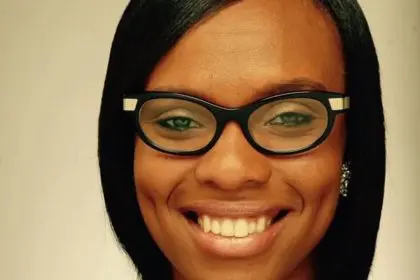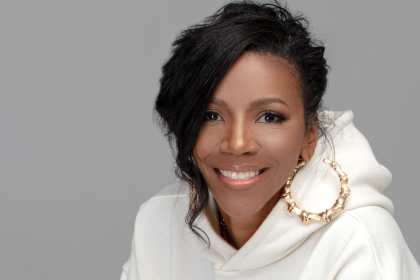In a repurposed community center in Gary, Indiana, one of America’s most pronounced food deserts, Dr. M. Dominique stands before a crowd of expectant mothers, demonstrating how to prepare nutrient-rich meals without salt or sugar. The women, many from neighborhoods where the nearest grocery store with fresh produce is miles away, watch intently as she transforms familiar cultural staples into healthier versions. This isn’t medical school curriculum; it’s frontline maternal healthcare activism.
“Sometimes, culturally, we just think that we need the salt or we need the sugar,” Dr. Dominique explains, her voice carrying the gentle authority that has made her a trusted figure in this community. “We don’t realize that chicken already has sodium in it. All you have to do is prep your food using natural seasonings to bring out those flavors.”
For Dr. Dominique, this cooking demonstration represents just one tactical response to a national crisis that has remained stubbornly resistant to conventional medical interventions: Black maternal mortality. In Lake County, Indiana, where she practices, infant mortality rates reach a staggering 14 per 1,000, nearly three times the national average of 5.6%. These statistics aren’t merely numbers to Dr. Dominique; they represent a calling that has evolved from a childhood dream to a comprehensive community wellness movement.
From divine calling to direct action
Dr. Dominique’s journey began with an inexplicable childhood fascination. “As long as I can remember, I’ve always wanted to deliver babies,” she says. “As a 5-year-old, I did not have a physician in my family that I was looking up to, so I just know that it was a calling from God.”
That calling drove her through an educational path strategically designed to understand healthcare from multiple vantage points. Before medical school, she became a certified nursing assistant to experience patient care from the bedside. Her undergraduate years included study abroad programs to learn different cultures’ approaches to health and wellness.
When she entered medical school at Rosalind Franklin University in Chicago, followed by residency at Mercy Hospital on the city’s South Side, Dr. Dominique found herself at the epicenter of America’s maternal health crisis. “At Mercy Hospital, we mainly took care of African American, Hispanic, and Asian women,” she recalls. “I can count on one hand, out of all of the hundreds of deliveries that I did at that hospital, I probably only interacted with less than 10 Caucasian white women.”
It was during her residency that national attention began focusing on Black maternal mortality rates. “That’s when it was like, ‘Whoa! I am in the right place at the right time to take action,'” she says. “That is when I started to really see the inequities that existed within African American women, why we were suffering, why these particular instances of maternal morbidity and mortality were happening to us.”
The 3 pillars of maternal health transformation
Dr. Dominique’s approach to addressing these disparities centers on three interconnected areas of intervention:
Preconception optimization “It really starts with preconception,” Dr. Dominique emphasizes. “This is before you’re pregnant. So if you’re even thinking about being pregnant, you really need to put yourself in a position where you’re at your optimal health.”
She educates women about weight management, nutrition, and vitamin optimization prior to pregnancy, knowing that maternal health status before conception significantly impacts placental formation and subsequent pregnancy outcomes.
Community support systems For Dr. Dominique, maternal health is inseparable from community health. “When you get pregnant, really, it’s the support. It’s the community that makes sure that not only the mom is aware, but they’re aware of different issues that can occur during pregnancy,” she explains.
This community-centered approach has led her to develop educational resources including a guide featuring the “top 10 questions” women should ask their physicians during pregnancy. One crucial question addresses hospital capabilities: “Do you know the hospital where you’re delivering at? Because sometimes we don’t realize that our hospitals are tiered in regards to the resources that they have, and it goes from level one to level four.”
Systemic barriers removal Perhaps most ambitiously, Dr. Dominique has begun addressing the structural inequities that compromise maternal health in marginalized communities. “We have a lot of food deserts. I work in Gary, Indiana, it is a food desert. My patients do not have the ability to go to grocery stores with lots of fruits and vegetables,” she notes. “Some of these things are actually systematically set up, which then put women in these terrible positions.”
To combat these systemic barriers, Dr. Dominique has established partnerships with local Black farmers to bring fresh produce directly to the community. She has also expanded her annual health fair into a comprehensive wellness event featuring 88 vendors providing services from healthcare screenings to workforce development.
Beyond the hospital walls
In 2023, Dr. Dominique made the pivotal decision to step away from full-time hospital employment, becoming an independent contractor to pursue her passion project: Prenatal Well, a nonprofit organization dedicated to reducing maternal and infant mortality.
“I’m now an independent physician, I can create my schedule how I want to, and I can still go after my passion,” she says, addressing common concerns about work-life balance in medical careers. “Sometimes we think like, ‘Oh, well, I want to do something that’s quick and fast,’ but if you’re really following your passion, if you’re really doing what you really want to do, that time will go so fast.”
Her nonprofit’s annual wellness fair has rapidly evolved from a modest health education event into a community institution. The inaugural event, organized in just four months, drew nearly 400 women, children, and family members, far exceeding expectations. This year’s event, scheduled for April 26 at the Dean and Barbara White Center in Merrillville, Indiana, will feature nearly triple the number of vendors, expanding beyond traditional healthcare to include housing resources, career opportunities, mental health services, and practical supports like free haircuts and hair braiding.
“I changed it from a health fair to a wellness fair,” Dr. Dominique explains, “because what I understood was that health and wellness was not just about, did they come to the physician, but did these women have a safe place to stay? Were these women in abusive relationships? Did they know where to go if they didn’t have formula or diapers for their baby?”
The holistic approach extends to including men in the maternal health conversation. “We have a men’s survey that we’re doing to make sure that we know how they feel when their partners are pregnant, when they’re becoming fathers, what they need to make sure that they are equipped with the knowledge to take care of their families.”
A model for maternal health activism
Dr. Dominique’s work represents a paradigm shift in addressing maternal health disparities, moving beyond the clinical setting to create community-based infrastructure that addresses the social determinants of health. Her approach acknowledges that maternal mortality isn’t simply a medical issue but a complex problem requiring multifaceted solutions.
As Black Maternal Health Week brings national attention to these disparities, Dr. Dominique finds solidarity in a growing movement. “I am not alone in this fight. There are women all across the country this week that are making a huge difference in regards to Black Maternal Health Week,” she says.
For the women of Lake County, Indiana, Dr. Dominique’s efforts represent more than healthcare, they offer hope. In an area where statistics paint a grim picture, her work demonstrates that community-driven interventions can create pathways to better outcomes. Through Prenatal Well, accessible via Instagram and Facebook, she continues to expand her reach, offering resources, guidance, and a vision for maternal healthcare that centers Black women’s needs and experiences.
In Dr. Dominique’s approach, we glimpse a future where maternal health disparities are addressed not just through medical interventions but through comprehensive community transformation, one cooking demonstration, one wellness fair, one expectant mother at a time.













